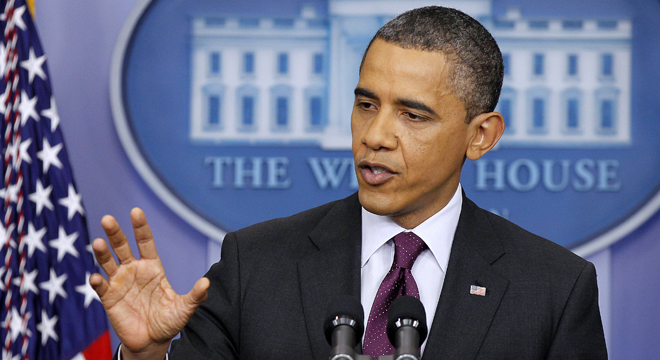A new Congressional Budget Office report has reignited the spin wars over President Obama’s budget, and Republicans are eagerly blasting articles to reporters about how the administration would explode deficits and debt if left to its own devices.
But this line of attack is based on a questionable premise, familiar to veterans of the past year’s budget wars.
The key to all of these stories is the CBO baseline. Officially, the budget analysts there use “current law” to gauge the expected impact of policy proposals, whether from the Hill or the White House. But under “current law” all the Bush tax cuts will expire, all of the sequestration spending cuts triggered by the Super Committee’s failure will take effect, and other parts of the budget will tighten automatically, in ways lawmakers and the president are determined to avoid. Relative to all of that austerity under current law, indeed, Obama’s budget blows up the budget. So too does every Republican budget proposal and every proposal put forward by influential outside fiscal policy groups.
CBO also uses an “alternative fiscal scenario” based largely on current policy. And the changes Obama proposes to current policy — the world we currently inhabit where the Bush tax cuts are still in effect, and sequestration hasn’t happened — accomplish one of fiscal policymakers’ key goals: reducing medium-term deficits and stabilizing the debt as a share of GDP over the next several years.
Here’s a chart we created from CBO’s own analysis.
That near-term debt path is pretty similar to the one House Republicans propose, with a program of deep cuts to federal programs and tax cuts.
If all of the austerity scheduled for the year is allowed to take effect, then indeed, CBO projects debt to fall faster than it would under Obama’s plan. But compared to where we’re headed if all the Bush tax cuts are extended, as Republicans want, and all the automatic spending cuts are nixed, the fiscal picture looks much worse.
Beyond that 10-year window, things are murkier — and this is where the parties are most at odds. Most projections suggest that after about 10 years, rising health care costs and an aging population will cause Medicare spending to explode, eventually overwhelming the budget. Obama’s plan staves this off for a few years — and thus buys policymakers and the health care system some running room to solve that problem without radically disrupting federal health care programs.
Republicans propose to address this problem largely by phasing out Medicare and providing seniors with subsidies to buy private insurance. Those subsidies would be limited — that’s how it solves the fiscal problem in the long term — leaving seniors to hope health care providers and insurers can solve the cost growth problem, or to pay significantly more out of pocket for their own care year after year.
That, in essence, is what House Budget Committee Chairman Paul Ryan and Treasury Secretary Tim Geithner were talking about when they squared off on Capitol Hill last month.











